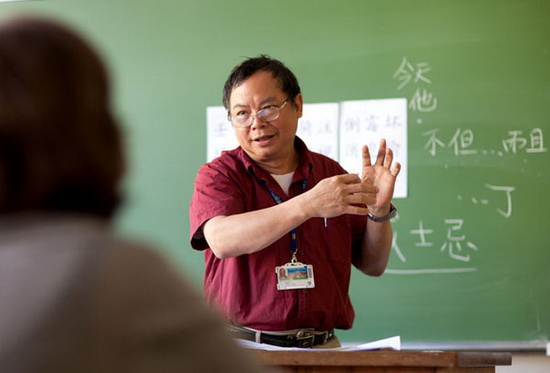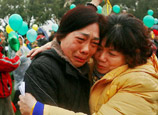
 |
| Wu Qianlong, director of the Confucius Institute at the University of Cape Town, gives a lecture on Chinese to South African students. Provided to China Daily |
Simple Chinese words can be heard when walking the main streets of Cape Town, arriving at passport control at Johannesburg airport, and while negotiating commodity prices in Durban.
An increasing number of South Africans are willing to learn Chinese language, culture and philosophy, and Confucius Institutes, a global Chinese-language learning network managed by the central government, is committed to teaching foreigners the language and immersing them in oriental culture.
Confucius Institutes, named after the renowned educator and thinker in ancient China, cooperate closely with foreign universities and schools to promote Chinese-language learning and cultural exchanges.
Professor Wu Qianlong, Confucius Institute director at the University of Cape Town, says the institute isn't new in South Africa or elsewhere in Africa, as many people, especially university students, have already begun learning Chinese through this platform.
Before arriving in Cape Town in 2010, Wu was a professor of English literature at the English education faculty of Guangdong-based Sun Yat-sen University.
The Confucius Institute he leads has three Chinese lecturers and one local administrative officer. His wife and son are living in China and have visited him each year since 2011.
Under the management of the foreign language department of the University of Cape Town, the Confucius Institute was set up there in 2010.
It holds two Chinese-language classes as a selective course for first- and second-year undergraduates. Eighty-five students are learning Chinese in these two grades and more than 220 have signed up for the course since 2011.
"We have seven classes each week and exam results will be logged as credits to students' academic records," Wu said.
Tough challenge
After giving several lectures in 2010, Wu found South African students speak different native languages because they have different linguistic backgrounds. This presented a strong challenge.
South Africa has 11 official languages: Afrikaans, English, Ndebele, Northern Sotho, Sotho, Swazi, Tswana, Tsonga, Venda, Xhosa and Zulu, with languages such as Dutch, Korean and Hindi also spoken in major cities.
Despite the fact that English is recognized as the language of politics, business and science, it ranked fourth and was spoken by only 9.6 percent of South Africans at home in 2011, according to the census released by Statistics South Africa in 2012.
"In the beginning, teaching Chinese in this multilingual environment was really tough,'' Wu said.
"People who are proficient in English have a better understanding of the course content as it is taught in English."
Wu later realized the course instructor should have the ability to communicate with students in more local languages such as Zulu and Sotho - two languages spoken by 40 percent of the country's population - to make them learn Chinese in a flexible way.
"Another challenge is that Chinese characters are symbols and students have difficulties comprehending and remembering them, because they have been reading and writing words in letters for years," he says.
Wu, aiming to let more people discover the richness of Chinese and its culture, has been studying Zulu for more than six months to improve his interpretation skills between Chinese, English and Zulu.
"For us, having a certain knowledge of widely-spoken languages will not only help us teach students in an efficient way, but can also create a new teaching path under such a multicultural background," Wu said.
Wu also teaches short-term classes to adults who want to travel or do business in China. The six-week course is designed to enable students to acquire basic written and oral competence in Chinese to greet people, introduce themselves, understand short descriptive sentences, and read and write short simple texts.
Wu has started to recruit more qualified lecturers and university volunteers from China to teach Chinese in three nearby middle schools.

















 'A Beautiful Daughter-in-law Era' drama hits Africa
'A Beautiful Daughter-in-law Era' drama hits Africa


![]()
